Wort und Tat is a 10-minute-long Nazi propaganda film directed by Fritz Hippler, which was released in 1938. The United States Holocaust Memorial Museum described the film as a "Propaganda film about the improved life of the German people under Hitler." The film is known for the extensive use of montage to get its message across, in a style reminiscent of Sergei Eisensteins Oktober. It was ordered by Joseph Goebbels.
Women Are Better Diplomats is a 1941 German musical comedy film from the Nazi era. Directed by Georg Jacoby and starring Marika Rökk, Willy Fritsch and Aribert Wäscher. It was based on a novel by Hans Flemming. The film was the first German feature film to be made in colour, and was one of the most expensive films produced during the Third Reich. The film met with a positive public response and was among the most popular German films of the early war years.

Bombs on Monte Carlo is a 1960 German comedy film directed by Georg Jacoby and starring Eddie Constantine, Marion Michael and Gunther Philipp. The film was based on a novel by Fritz Reck-Malleczewen which had already been adapted as a film in 1931 as Bombs on Monte Carlo.
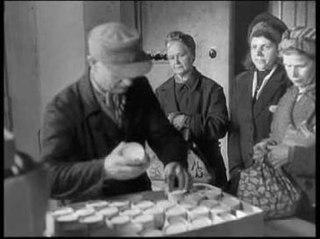
Der Weg nach oben is an East German political and economic propaganda film in the style of a documentary film directed by Andrew Thorndike. It was released in 1950, premiering on the eve of the first anniversary of the German Democratic Republic. It won the Best Documentary Film at the Karlovy Vary International Film Festival in 1951. The film was produced by DEFA Studio für Wochenschau und Dokumentarfilme. This was Thorndike's first feature-length film.
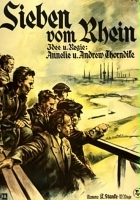
Die Sieben vom Rhein is an East German documentary film directed by Andrew and Annelie Thorndike. It was released in 1954. Thorndike made the film with his wife Annelie; it was made as part of the "Germans at the Same Table" campaign, and documented the visit of a West German workers delegation from the Ruhr to an East German steel factory in Riesa. According to author Bert Hogenkamp, "even political opponents had to admit that Andrew and Annelie Thorndike had made a masterpiece".
Das häßliche Mädchen is a German comedy film made in early 1933, during the transition from the Weimar Republic to Nazi Germany, and premièred in September that year. It was the first or second film directed by Hermann Kosterlitz, who left Germany before the film was completed and later worked in the United States under the name Henry Koster, and the last German film in which Dolly Haas appeared; she also later emigrated to the US. A Nazi-led riot broke out at the première to protest the male lead, Max Hansen, who was supposedly "too Jewish." The film's representation of the "ugly girl" as an outsider has been described as a metaphorical way to explore the outsider existence of Jews.
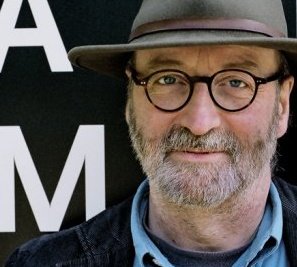
Hans-Michael Bock is a German film historian, filmmaker, translator and writer.
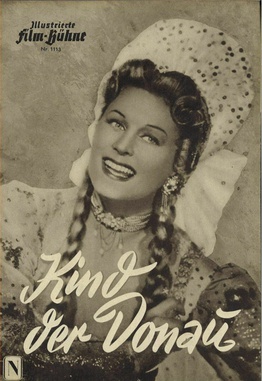
Child of the Danube is a 1950 Austrian musical film directed by Georg Jacoby and starring Marika Rökk, Fred Liewehr and Harry Fuß. It was one of a cycle of popular musicals made by Jacoby and Rökk. The film was shot using Agfacolor at the Soviet-controlled Rosenhügel Studios in Vienna. Location shooting took place around Linz on the River Danube. The film's sets were designed by the art director Julius von Borsody.
Andrew Thorndike was a German documentary film director. He directed 16 films between 1949 and 1977. His 1950 documentary, Der Weg nach oben, won the Best Documentary Film at the Karlovy Vary International Film Festival in 1951. He was a member of the jury at the 5th Moscow International Film Festival. At the 11th Moscow International Film Festival in 1979, he was awarded the Honorable Prize for his contribution to cinema.

Mother and Child is a 1934 German drama film directed by Hans Steinhoff and starring Henny Porten, Peter Voß, and Elisabeth Wendt. It is a sound remake of the 1924 silent film Mother and Child which had been a major hit for Porten. Franz Schroedter worked as art director on the film.
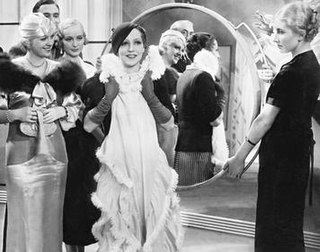
Just Once a Great Lady is a 1934 German comedy film directed by Gerhard Lamprecht and starring Käthe von Nagy, Wolf Albach-Retty and Gretl Theimer. Nagy plays a car saleswoman. The film's sets were designed by the art directors Otto Erdmann and Hans Sohnle. A separate French-language version A Day Will Come (1934) was also released, with Nagy reprising her role alongside Jean-Pierre Aumont.
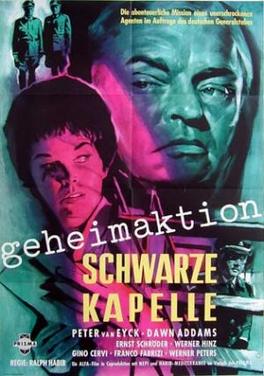
The Black Chapel is a 1959 political thriller film directed by Ralph Habib and starring Dawn Addams, Peter van Eyck and Ernst Schröder. It is based on the novel Die schwarze Kapelle by Olav Herfeldt. It is a co-production between West Germany, Italy and France.
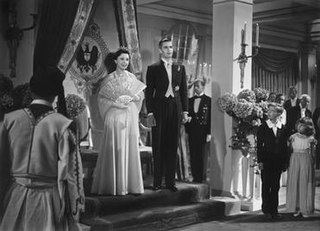
Royal Children is a 1950 West German comedy film directed by Helmut Käutner and starring Jenny Jugo, Peter van Eyck and Hedwig Wangel. It was shot at the Bavaria Studios in Munich and on location in Bad Wimpfen and at Hornberg Castle. The film's sets were designed by the art director Bruno Monden and Hermann Warm. It was a major commercial failure on release.
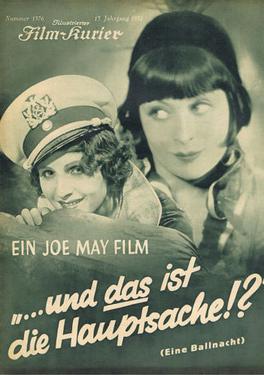
That's All That Matters is a 1931 German musical comedy film directed by Joe May and starring Nora Gregor, Harry Liedtke and Ursula Grabley. It was shot at the Babelsberg Studios in Potsdam. The film's sets were designed by the art director Otto Hunte. It premiered at the Gloria-Palast in Berlin.

Between Time and Eternity is a 1956 West German-Spanish drama film directed by Arthur Maria Rabenalt and starring Lilli Palmer, Willy Birgel and Carlos Thompson. It was co-produced with Spain as part of a growing trend in European production.

The Valley of Death or Winnetou and Shatterhand in the Valley of Death is a 1968 western film directed by Harald Reinl and starring Lex Barker, Pierre Brice and Rik Battaglia. It was the last in a series of films based on Karl May novels. These had previously enjoyed major commercial success, although this film's box office returns were disappointing. It was effectively a remake of an earlier film in the series Treasure of the Silver Lake.

The Coral Princess is a 1937 German-Yugoslav comedy film directed by Victor Janson and starring Iván Petrovich, Hilde Sessak and Ita Rina.

Love, Death and the Devil is a 1934 German drama film directed by Heinz Hilpert and Reinhart Steinbicker and starring Käthe von Nagy, Albin Skoda and Brigitte Horney. It is based on Robert Louis Stevenson's story The Bottle Imp.

Tell Me Who You Are is a 1933 German comedy film directed by Georg Jacoby and starring Liane Haid, Viktor de Kowa and Olly Gebauer.
The Iron Cross is a 1914 German silent film directed by Richard Oswald and starring Friedrich Kühne, Hedda Vernon, and Hanni Weisse. It marked the directorial debut of Oswald.















